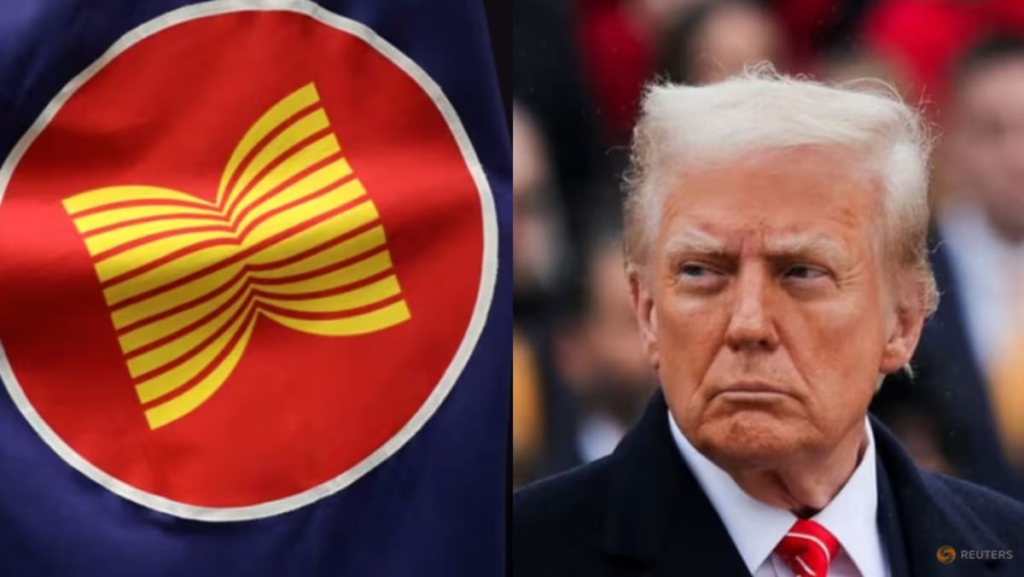Economist Siwage Dharma Negara, who is also the coordinator of the Indonesia Studies Programme at the ISEAS-Yusof Ishak Institute, told CNA that a failure to negotiate lower tariffs with the US will dampen this ambition.
“If the 32 per cent tariff by the US on Indonesian exports is fully implemented, this will pose a significant challenge to Prabowo’s ambitious goal of achieving 8 per cent economic growth during his term,” he added.
“Such setbacks make even a 5 per cent growth target more challenging to attain.”
Bhima Yudhistira Adhinegara, director of the Center of Economic and Law Studies in Indonesia, said Jakarta’s links to the global supply chain make its economy “very sensitive” to the US tariffs.
“Whatever goods that we produce and send to China, for instance, at the end of the day Chinese companies also send their products to the US,” he told CNA.
“The second thing is because of the currency fluctuations. Rupiah against US dollars is very sensitive to everything, to raw material imports, remittances and also the (rising) living costs that Indonesian consumers will bear soon.”
Bhima warned that Indonesia could be hit with a double whammy as major manufacturing hubs like China and Vietnam train their sights on alternative markets, especially Indonesia’s large consumer base, to avoid US tariffs.
This means Indonesia will not be able to fully capitalise on its own base as locally-made products – that are typically exported to the US – will not be able to compete with products from China and Vietnam that will soon flood the domestic market.
“It makes it very difficult, from the Indonesia exporters’ perspective, to shift their products from the US market to the domestic market here, because the prices are a little bit expensive,” he explained.
Indonesia announced a spate of concessions for US imports on Tuesday, including reducing taxes on electronic goods and steel.
Finance Minister Mulyani Indrawati said Indonesia would also lower import taxes on mining products and health equipment from the US.
Indrawati said there is room for Indonesia to replace Vietnam, Bangladesh, Thailand and China as a source of some exports to the US under the new tariff regime.
Southeast Asia’s biggest economy will also send a high-level delegation to the US next week seeking a deal to ease the impact of its 32 per cent tariff.
Prabowo has emphasised that his country will not engage in retaliatory measures but will instead pursue diplomatic negotiations.
Indonesia also plans to buy liquefied petroleum gas, liquefied natural gas and soybeans from the US as part of the negotiation efforts, said chief economic minister Airlangga Hartarto, who will lead Indonesia’s delegation to the US.
Despite that, Bhima asserted that Jakarta has not displayed “seriousness” in tackling the issue, noting that the post for Indonesia’s envoy to Washington has been left vacant for two years.
The analyst urged the Prabowo government to “act fast” and start formulating fiscal stimulus policies, such as utility discounts for entrepreneurs and looser loan or credit terms for industries hit by US tariffs.
“The sense of crisis is missing from the Indonesian government … We want to keep our optimism, but on the other hand, we must acknowledge there’s a huge problem ahead,” he said.
Failure to hit 8 per cent growth aside, further economic troubles will worsen already waning public trust in the current administration amid recent controversial policies involving the roles of the police and military, Bhima said.
“If people see the impact of the US tariffs becoming uncontrollable and the currency (further) weakens against the US dollar – let’s say 18,000 per dollar – I think trust in the central bank and government will decline,” he added.
“The (added) political instability will be a burden on the Indonesian economy … The future of Indonesia, in that sense, is not bright enough. People are already fed up.”
Over in Malaysia, the socioeconomic analyst Oh said the impacts of a 24 per cent US tariff rate could likewise erode public confidence in Prime Minister Anwar Ibrahim’s government, pointing to the possibility of higher prices, job losses and diminished economic opportunities.
“Voters, notoriously sensitive to immediate economic pressures, may not distinguish between global trade dynamics and domestic policy failures, attributing their hardships to Anwar’s leadership,” he said.
“This vulnerability offers opposition parties a potent political narrative – or as some may say ‘bullets’ – framing the downturn as evidence of governmental incompetence.”
Still, Oh opined that the tariffs represent a “double-edged sword” for Anwar, who has a “rare chance to demonstrate resilience and vision” in steering Malaysia through this turbulent period.
He cited how many Malaysians remain appreciative of former premier Mahathir Mohamad’s efforts in speeding up the country’s recovery from the 1997 Asian Financial Crisis by pegging the ringgit to the US dollar.
“So, if Anwar navigates this storm effectively, minimising economic damage relative to neighbours, the political payoff could be substantial at both national and regional (ASEAN) stages,” he added.
https://www.channelnewsasia.com/asia/trump-tariffs-could-hit-asean-economies-hard-potential-political-price-leaders-5051781


